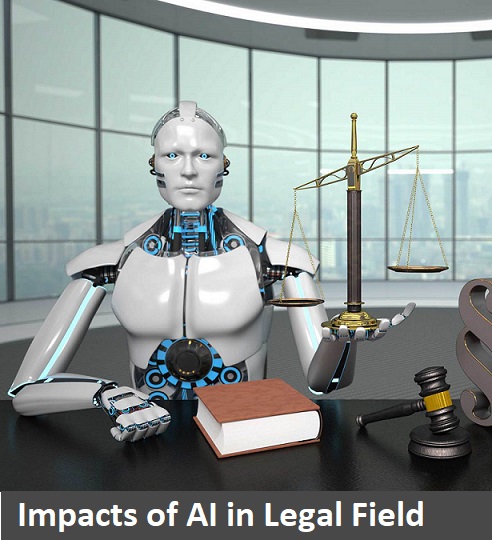The Impact of Artificial Intelligence on the Legal Industry Artificial Intelligence (AI) has been making waves in various industries, and the legal field is no exception. From document review to legal research, AI is being integrated into various aspects of the legal profession, bringing with it a host of benefits and potential drawbacks.
AI has begun to be used to help draft contracts, predict legal outcomes, and even recommend judicial decisions about sentencing or bail.
In this article, we’ll explore how AI is being used in the legal industry, the potential benefits and drawbacks of this technology, and the ethical implications of using AI in the legal system.
Table of Contents
Document Review
One of the most significant ways AI is being used in the legal field is through document review. With the advent of e-discovery, the process of reviewing documents for relevance and privilege in the discovery phase of a legal case has become increasingly time-consuming and costly. AI-powered document review tools, such as Relativity Trace and the e-discovery platform, can quickly scan and identify relevant documents, reducing the time and cost associated with manual review.
Legal Research
AI is also being used for legal research, with tools such as LexisNexis and Ravel Law providing access to vast amounts of legal information, and using natural language processing to help lawyers quickly find relevant case law and statutes.
Must Read: Rule of Law in Pakistan
Benefits of AI in the Legal Industry
The integration of AI into the legal field brings with it a number of potential benefits. For example, the use of AI-powered document review can save time and money, while AI-powered legal research can help lawyers quickly access relevant information, allowing them to better serve their clients. Furthermore, AI can help to reduce the risk of human error, such as missing a relevant document during the review process.
Drawbacks of AI in the Legal Industry
While the integration of AI into the legal field brings with it a number of potential benefits, there are also some potential drawbacks to consider. One of the major drawbacks is the potential loss of jobs for human reviewers. With the increasing use of AI-powered document review tools, there may be less need for human reviewers to manually sift through documents, potentially leading to job loss.
Job Loss for Human Reviewers:
There are also concerns about the transparency and accountability of AI-powered systems, as it may be difficult to understand how a particular decision was reached. This can be a problem when the results of AI-powered systems are used in legal proceedings and it’s important to understand the reasons behind a particular decision.
Related Article: Fundamental Rights in the Constitution of Pakistan
Inaccurate or Incomplete Results :
Additionally, AI-powered legal research may not fully capture the nuances and complexities of the law, leading to inaccurate or incomplete results. While AI-powered tools can quickly search through vast amounts of legal information, they may not be able to fully understand the context or intent of the information, potentially leading to errors in the results.
Risk of Bias Transparency and Accountability :
Another potential drawback of AI in the legal industry is the risk of bias. AI-powered decision-making systems may be based on historical data, which may be biased toward certain groups or individuals. For example, there is a risk that AI-powered systems may be more likely to falsely accuse a defendant from a certain ethnic group or socio-economic status.
Lacks Human-level Understanding :
In addition, AI is not yet able to replace human-level understanding in the legal field, it lacks the ability to understand the nuances and subtleties of the legal system, which is heavily dependent on the interpretation of the law and human factors.
Also Read: Role of Islamic Laws in Pakistan
Conclusion:
In conclusion, while AI has the potential to bring significant benefits to the legal industry, it is important to consider the potential drawbacks and take steps to mitigate them. This may include developing regulations and guidelines to ensure that AI-powered systems are transparent and accountable, and training lawyers and other legal professionals in the use of AI tools and techniques.
Ethical Implications
There are also ethical implications of using AI in the legal system. For example, there are concerns about the potential for bias in AI-powered decision-making, particularly in criminal cases where a defendant’s freedom may be at stake. Additionally, there are concerns about the transparency and accountability of AI-powered systems, as it may be difficult to understand how a particular decision was reached.
Future of Legal Profession
The integration of AI in the legal industry may also have a significant impact on the future of the legal profession. With the increasing use of AI-powered tools for document review and legal research, there may be a shift in the roles and responsibilities of lawyers, with an increased focus on strategic thinking and problem-solving rather than on more routine tasks.
Training and Education
As AI becomes more prevalent in the legal industry, there will be an increasing need for lawyers to be trained and educated in the use of AI tools and techniques. This may include the development of new educational programs and training opportunities specifically focused on AI in the legal field.
Must Read: Challenges for Foreign Investment in Pakistan
Conclusion
Overall, AI has the potential to revolutionize the legal industry, bringing significant benefits in terms of cost savings, improved efficiency, and reduced risk of human error. However, there are also potential drawbacks, including job loss and concerns about bias and accountability. As the use of AI in the legal field continues to grow, it will be important to consider these issues and to ensure that the technology is used in a responsible and ethical manner. In conclusion, the incorporation of AI in the legal profession is a double-edged sword, it could bring efficiency and cost savings but also raise


